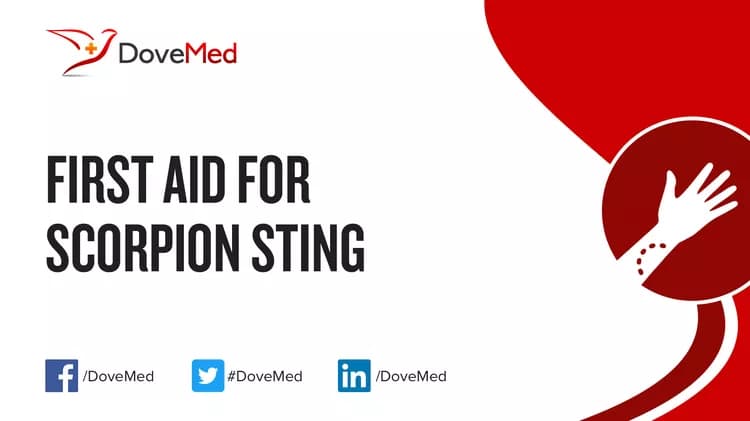What is Scorpion Sting?
- Scorpion Stings are wounds or reactions caused on contact with a scorpion. It is generally a very uncommon incident
- Scorpions are found all over the world, but many avoid human habitats. Some scorpion species share their habitat with humans and can inflict a painful sting with their tail, injecting venom (which is generally a neurotoxin) in the process
- In many cases, the effect of the venom is not life-threatening in humans. However, some scorpions are potent enough to cause severe symptoms and even death
What are the Causes of Scorpion Sting?
There are several hundreds of species of scorpions living all over the world. However, only a few are known to be toxic to humans (and having painful stings). Some of these include:
- Arabian fat-tailed scorpion
- Arizona bark scorpion
- Deathstalker scorpion
- Emperor scorpion
- Indian red scorpion
Scorpions generally sting on provocation, which may be unintentional or inadvertent, when they are suddenly disturbed.
What are the Signs and Symptoms of Scorpion Sting?
The signs and symptoms of Scorpion Stings depend on the species of scorpion involved and it can vary from one individual to another. The signs and symptoms also depend on the age (whether child or adult), weight, and overall health status of the individual (whether having an underlying condition or illness).
In general, the signs and symptoms of a Scorpion Sting may include:
- Pain, burning and tingling sensation at the sting site, if the condition is mild
- Swelling at the sting site; red marks and intense pain (typically a single red dot at the sting site may be observed)
- Breathing difficulties; absence of breathing
- Irregular heart rate
- Urination difficulties; reduced urine level
- Blurring of vision, rapid eye movement
- Increased salivation from the mouth
- Diarrhea
- Stomach or abdominal pain
- Feeling restless and dizzy
- Stiff muscles; muscle contraction from effects of the venom
- Convulsions and paralysis
How is First Aid administered for Scorpion Sting?
First Aid tips for Scorpion Stings:
- Call 911 (or your local emergency number) for emergency assistance, in case of severe and life-threatening symptoms
- Call the Poison Control Center at 1-800-222-1222 (or your local poison control center) for further instructions
- Clean the sting site with soap and water
- Elevate the limb, if the sting is on the extremities
- Consider taking antihistamine for allergic reactions, and aspirin or acetaminophen to relive pain
- Seek medical advice, before giving any kind of medications to children
- Apply a tight bandage slightly above the site of the sting, to stop the venom from spreading. However, care must be taken to ensure that the bandage is not too tight and it does not prevent blood flow
- Put a wet, cold cloth on the affected area (avoid the use of ice)
- In case of breathing difficulties, the affected individual may require a CPR (which should be performed by a trained professional)
- Seek medical help
- If safely possible, take the scorpion (or parts of it) to the healthcare facility center for identification
Who should administer First Aid for Scorpion Sting?
The individual who is affected, or someone near should administer initial first aid, following which one should seek medical help.
What is the Prognosis of Scorpion Sting?
- The prognosis of Scorpion Sting is dependent on the type of scorpion involved, site of the sting, the severity of reaction, and the overall health of the individual. In most cases, the prognosis is typically good with appropriate and timely treatment
- Fatalities are reported in children below the age of 6 years, older adults, and in those with compromised immune system or underlying illnesses, mostly due to the absence of appropriate and timely treatment
How can Scorpion Sting be Prevented?
Scorpion Stings may be prevented by the following measures:
- Being alert, if you are in scorpion-infested regions, particularly containing dangerous scorpion species
- Avoid being outdoors at night in forested or desert areas
- Avail pest control in areas where the scorpions are found in large numbers
- Wear clothes that cover the entire body while outdoors in the evenings or at nights
- Avoid wearing clothes or shoes that have been lying around undisturbed for a while, without first inspecting them thoroughly
- Do not reach into dark nooks/corners/recesses of the house with your bare hands/foot
- Do not let clutter accumulate in various parts of the house (such as in the cellar, garage, closets, etc.)
What are certain Crucial Steps to be followed?
- Call 911 (or your local emergency help number), if the condition is serious
- Administer antihistamines, if the individual has an allergic reaction
- Identifying the correct scorpion species involved is important
Related Articles
Test Your Knowledge
Asked by users
Related Centers
Related Specialties
Related Physicians
Related Procedures
Related Resources
Join DoveHubs
and connect with fellow professionals


0 Comments
Please log in to post a comment.